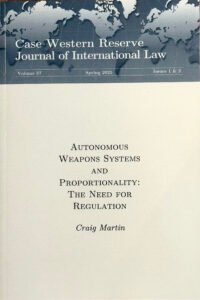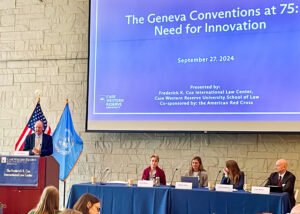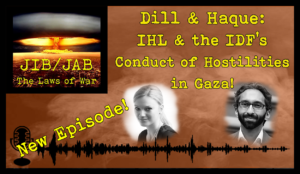 I have launched a new substack, entitled Law in Crisis, which some might find interesting. As the masthead explains, it is a forum for “musings on how law can help our response to crises, and how to respond to the crisis in law itself – use of force and armed conflict, climate change and security, AI and security, constitutional and int’l human rights, and the rule of law more generally.” The plan is to publish an essay of between one to two thousand words at least once a week.
I have launched a new substack, entitled Law in Crisis, which some might find interesting. As the masthead explains, it is a forum for “musings on how law can help our response to crises, and how to respond to the crisis in law itself – use of force and armed conflict, climate change and security, AI and security, constitutional and int’l human rights, and the rule of law more generally.” The plan is to publish an essay of between one to two thousand words at least once a week.
IHL/LOAC
Autonomous Weapons Systems and Proportionality – New Article
 Published a new law review article, “Autonomous Weapons Systems and Proportionality: The Need for Regulation,” in the Case Western Reserve Journal of International Law, Vol. 57:1 (2025). The full text is available for download at SSRN here, and the abstract is below:
Published a new law review article, “Autonomous Weapons Systems and Proportionality: The Need for Regulation,” in the Case Western Reserve Journal of International Law, Vol. 57:1 (2025). The full text is available for download at SSRN here, and the abstract is below:
This article examines the question of whether International Humanitarian Law (IHL) requires modification to effectively govern autonomous weapons systems (AWS). While extensive scholarly discourse has focused on whether AWS can comply with existing IHL principles, and whether the development and deployment of AWS should be constrained through weapons treaties, insufficient attention has been paid to why and how IHL itself might need adaptation to regulate AWS as a method of warfare. Given that the imminent development and deployment is unlikely to be prohibited, and that AWS may not comply with IHL in certain circumstances, the question of why and how IHL needs to be adjusted is important. The analysis focuses on the principle of proportionality as a means of exploring and illustrating the issue.
The article first traces the evolution of AWS governance debates, highlighting the impasse at the Convention on Certain Conventional Weapons (CCW) regarding constraints on AWS development. It then conducts a detailed examination of the distinct elements and operation of the principle of proportionality, a principle whose implementation demands complex, contextual, and sophisticated judgment.
The article examines the evidence of certain weaknesses of AI-operated AWS, explains why the operationalization of the principle of proportionality would present challenges for such systems, and argues that AWS would likely struggle to implement the principle reliably and predictably in certain operational contexts. The final section supports and defends proposals for the certain adjustments or modifications of IHL to better regulate AWS, thereby ensuring AWS operations remain constrained by the core principles of IHL. It ends by briefly exploring the mechanisms that might be available for developing such constraints.
Discussing Autonomous Weapons Systems and IHL at Case Western Law
 Case Western University School of Law’s annual international law symposium this year focused on the question of whether the Geneva Conventions, enjoying their 75th Anniversary, need to be updated to deal with new challenges, including the application of IHL to space, expanding transnational conflicts with non-state actors, cyber-war, and the development and deployment of fully autonomous weapons systems. The conference began with a closed experts group meeting to discuss the development of a white paper on the issues, followed by an open conference with panels on each of the major topics.
Case Western University School of Law’s annual international law symposium this year focused on the question of whether the Geneva Conventions, enjoying their 75th Anniversary, need to be updated to deal with new challenges, including the application of IHL to space, expanding transnational conflicts with non-state actors, cyber-war, and the development and deployment of fully autonomous weapons systems. The conference began with a closed experts group meeting to discuss the development of a white paper on the issues, followed by an open conference with panels on each of the major topics.
My panel, with Laurie Blank of Emory Univ. Law, Milena Sterio of Cleveland Univ. Law, and Romina Morello of the ICRC, fielded questions from Paul Williams of American Univ. Law, on whether, and how, the Geneva Conventions might need to be updated in some form to better regulate the use of autonomous weapons systems. My article on the subject will be published next year in the Case Western Journal of International Law. Great conference.
JIB/JAB: Episode 39 – Dill and Haque on IHL and the Conduct of the IDF in Gaza
 In this episode I discussed the question of whether it is possible now, while hostilities are still ongoing, to assess whether some aspects of the IDF’s conduct of hostilities may be in violation of IHL, with two of the top experts on the issues: Janina Dill of the University of Oxford and Adil Haque of Rutgers Law School. For more on the episode, including all the supporting reading material, visit the website!
In this episode I discussed the question of whether it is possible now, while hostilities are still ongoing, to assess whether some aspects of the IDF’s conduct of hostilities may be in violation of IHL, with two of the top experts on the issues: Janina Dill of the University of Oxford and Adil Haque of Rutgers Law School. For more on the episode, including all the supporting reading material, visit the website!
